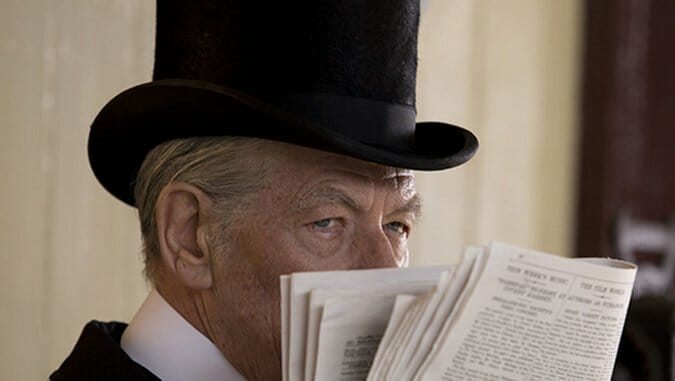Mr. Holmes

Though Sherlock Holmes may be one of the most-portrayed literary characters in film and television history, the actors best known for playing the British detective—from Basil Rathbone and Robert Downey Jr. on one kind of (generally) larger screen to Benedict Cumberbatch and Jonny Lee Miller on the (probably) smaller—have managed to put an individual spin on Sir Arthur Conan Doyle’s creation. The latest to take on the iconic role is Sir Ian McKellen, who has crafted a cinematic Sherlock that’s nothing like his predecessors: We find a retired detective who’s vincible—past his prime and struggling with both failing health and memory.
Mr. Holmes reteams McKellen and director Bill Condon, who previously worked together on 1998’s Gods and Monsters, a film that earned Condon an Academy Award for Best Adapted Screenplay and McKellen a nomination for Lead Actor. Adapted by screenwriter and playwright Jeffrey Hatcher (Stage Beauty, The Duchess) from Mitch Cullin’s novel A Slight Trick of the Mind, Mr. Holmes proves to be a worthy follow-up 17 years later, an admirable juggling of three distinct storylines—each with its own twist—that somehow can keep an audience rapt until its mysteries are unraveled and resolved in a number of surprising ways.
Condon carries Mr. Holmes forward from the late 19th/early 20th century to 1947. We first glimpse the aging detective as he returns home to England from a visit to post-war Japan, where he was searching for the prickly ash, a plant which supposedly has curative properties. There he was guided by a botanist (Hiroyuki Sanada) with ulterior motives for bringing Holmes to Japan. The two find the prickly ash growing among the ruins of Hiroshima’s vast wasteland, which not-so-subtly reflects what Holmes’s own life has become, but the presence of the plant amongst such destruction gives the detective hope that it could possibly restore some of his waning faculties.
Back home, Holmes tends to his papers and his beloved bees. His small circle of friends—Dr. Watson, his brother Mycroft and Inspector Lestrade—have all died, and his only company is his housekeeper Mrs. Munro (Laura Linney) and her young son Roger (Milo Parker). Tension exists between the widow Munro and Holmes: She doesn’t see the great mind that once was, only a curmudgeonly man in her care. Their relationship seems transactional at best, with Linney expertly playing a woman on the edge, worn down by the loss of her husband to war and wary of her employer. It doesn’t help that Holmes remains aloof, decidedly stubborn and lacking basic social graces. (In one harrowing scene, Roger is seriously injured and Holmes rushes past Mrs. Munro to call an ambulance, without bothering to tell her that her son could be mortally wounded.)
-

-

-

-

-

-

-

-

-

-

-

-

-

-

-

-

-

-

-

-

-

-

-

-

-

-

-

-

-

-

-

-

-

-

-

-

-

-

-

-








































